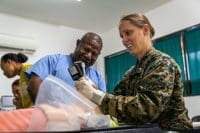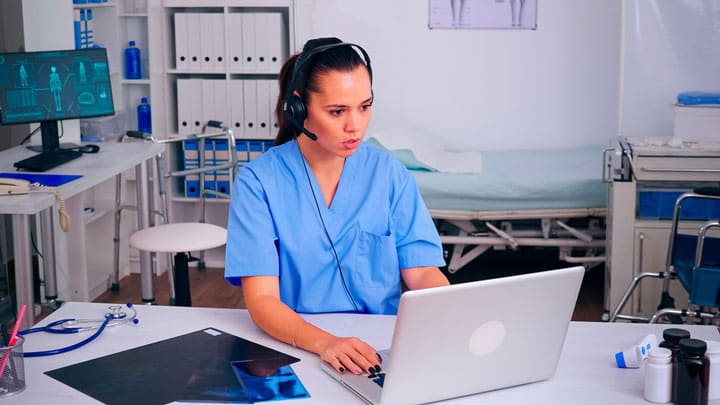Exposure to diverse nursing leaders builds confidence and inspires professional growth.
- Current U.S. demographics don’t reflect the race and ethnicity of healthcare professionals.
- Nurses of color and those from other marginalized groups face several barriers to pursuing career advancement, including racial discrimination, few role models, and lack of support.
- Exposure and mentorship can serve as a mechanism to address the mismatch between patient and nursing workforce demographics.
The Institute of Medicine’s Future of Nursing 2020–2030: Charting a Path to Achieve Health Equity charges nursing with addressing equity in healthcare and disparities in outcomes and care. However, according to Smiley and colleagues, race and ethnicity of healthcare professionals don’t reflect current U.S. demographics. This gap extends across all nursing specialties and education levels but particularly so among nurses with a PhD, who conduct research, and those with a doctorate of nursing practice (DNP), who translate that research. This lack of ethnic diversity among nurse researchers has adverse downstream effects that contribute to health disparities. (See Demographics.)
Demographics
According to the most recent U.S. Census Bureau American Community Survey, the U.S. population breaks down as follows:
- 76% White
- 19% Hispanic or Latino
- 14% Black/African American
- 6% Asian
- 3% More than one race
- 0.3% Native American.
The percentage of individuals who identify as White closely matches nurses who identify as White. In 2022, the nursing workforce demographics included the following:
- 80% White
- 7.4% Asian
- 6.9% Hispanic
- 2.5% Black/African American
- 0.4% Native American
- 0.4% More than one race.
Nurses of color and those from other marginalized groups face several barriers to pursuing career advancement, including racial discrimination, few role models, and lack of support. However, exposure and mentorship can serve as a mechanism to address the mismatch between patient and nursing workforce demographics. Participation in programs that expose clinical nurses to the research process strengthens self-confidence to engage in research, allows for interaction with doctorally prepared diverse nurses (you can’t be what you can’t see), and presents the possibility of pursuing advanced education. The Connell-Jones Endowed Chair Diversity Research Scholars (DRS) program at Massachusetts General Hospital exposes clinical nurses to the research process on their clinical practice.
The argument for mentorship
According to Ku and Vichare, racial or ethnic concordance between a patient and a clinician increases patient satisfaction and overall health outcomes. The researchers also found that clinicians who match a patient’s culture and identity tend to communicate most effectively.
Racial or ethnic concordance among nurse researchers and participants also may facilitate communication to address the specific needs of the diverse U.S. population and move nursing science forward. However, the 2022 National Nursing Workforce Survey found that less than 1% of the nursing workforce have a research doctorate and less than 2% have a DNP. In addition, according to Smiley and colleagues, less than 1% of nurses with a doctorate are racially or ethnically diverse. Mentorship offers an opportunity to address this deficit.
Nurse mentors guide and support mentees, challenge them to think more critically and deeply, limit the need for learning through trial and error, and provide opportunities to discuss professional development. Brown-DeVeaux and colleagues developed a quality-improvement mentorship initiative to address the lack of racially and ethnically diverse nurse leaders. The initiative aimed to enhance the self-efficacy and self-confidence of racial or ethnic minority nurse leaders and prepare them for further career advancement. The results of the project showed that 50% of the ethnic minority nurse leaders who participated in the program felt more inspired to obtain a promotion and search for other vertical positions.
It can be argued that nurse researchers serve as nurse leaders. For example, a nurse scientist within a healthcare organization can shape the culture of clinical inquiry and scholarly contributions by bridging the gap between empirical knowledge and clinical practice. As such, a mentorship program aimed at increasing the appreciation and application of nurse research can lead to increased self-efficacy, satisfaction, and promotion.
The program
Goals of the Massachusetts General Hospital DRS program, which launched in 2021, included exposing clinical nurses to the research process, increasing self-confidence to engage in research, providing participation within an existing research team, and allowing for interaction with doctorally prepared, diverse nurses. The program focused on mentoring ethnically diverse nursing staff interested in nursing research and health inequities.
The DRS team encouraged clinical nurses interested in learning more about nursing research and inquiry to apply. The team shared communication about the program with nursing leaders, who passed it along to staff and, in some cases, encouraged participation. As part of the application process, potential participants wrote a narrative about their interest in the program and what they hoped to learn. The program, grounded in clinical practice, recognizes that nurses generate research questions during interactions with patients and their families.
Ultimately, the DRS team identified 27 scholars and matched them with ethnically diverse nurse researchers for an 8-week immersive program. Two participants and co-authors of this article (Luis and Ana) share their experiences.
Luis’ story
Luis felt drawn to the program’s proposal to address the importance of diversity in healthcare leadership and how diverse perspectives can lead to better patient outcomes. He was excited about the program’s potential for upward mobility and the opportunity to make a meaningful impact in healthcare. “When I first arrived in the United States on a tourist visa without speaking a word of English, my primary goals were to learn the language and become a respected professional,” said Luis.
His decision to pursue a career in nursing stemmed from practical reasons. He began his career with an associate degree, working in an oncology unit. When he decided to return to school, Luis stopped working full-time and held “housecleaning and odd jobs” until he completed his bachelor of science in nursing degree. After graduation, he returned to his home unit and flourished, frequently participating in policy development for the oncology infusion unit. Luis also became certified in peripherally inserted central catheterization. In this role, Luis collaborated with various diverse colleagues across his organization and received two Partners in Excellence awards. This recognition signifies and celebrates outstanding practice and leadership.
According to Luis, when he learned about the inaugural cohort of the DRS fellowship program it gave him pause. “It was focused on nursing research, an area that I had not previously been personally interested in,” said Luis. “However, I ultimately decided to apply because the DRS program was not solely about nursing research, but also equity. As an LGBTQ+ person of color and immigrant nurse, I have firsthand experience with the disparities underserved patients face in accessing quality healthcare. The DRS program aligned with my passion for addressing these disparities and promoting equity in healthcare.”
At the beginning of the program, Luis felt apprehensive and nervous. “I never thought of myself as a healthcare leader,” said Luis. “I was afraid I wasn’t good enough for the program.” Over time, he gained confidence. Despite not being the most vocal or inquisitive participant, Luis felt that the program never doubted his potential. This validation created a supportive environment where he felt valued and encouraged to explore his interests and passions. According to Luis, the DRS program expanded his knowledge and skills and instilled a sense of confidence in his abilities as a nurse of color.
The program’s recognition of systemic inequities within the healthcare system resonated with Luis. Sessions and interactions served as reminders of the challenges faced by non-white providers and patients and focused on the need to actively address these disparities. This acknowledgment added depth to the program, which expanded Luis’ understanding and empowered him to make a meaningful impact.
The program’s resources and support enabled Luis to implement a transportation program for patients from his home unit (the Henri and Belinda Termeer Center for Targeted Therapies, which focuses on Phase 1 oncology research) who live in underserved communities. Drawing on the social determinants of health taught in the DRS program, Luis identified transportation as a significant barrier for many underserved patients wishing to access oncology research care. As a result of his efforts, the Termeer Center began offering free rides to underserved patients participating in Phase 1 oncology research trials, helping to ensure they can attend appointments. The transportation program has since grown and now operates in other units within the Massachusetts General Hospital Cancer Center.
Through these experiences, Luis not only developed leadership skills but also gained a profound understanding of the importance of cultural competence, community engagement, and social responsibility in nursing. Luis strongly believes that the DRS program plays a crucial role in empowering nurses of color to actively confront and address the systemic inequities within their practice, ultimately working toward a more equitable healthcare system for everyone.
“The program not only raises awareness but also helps nurses of color recognize and understand the unique challenges they face, particularly about intersectionality,” explained Luis.
Nurses of color frequently confront the exhausting task of managing discrimination and racism. Feeling the need to constantly prove themselves can impact their self-perception and hinder career advancement. By providing a supportive and inclusive environment, the DRS program enables nurses of color to gain confidence and find their voices. The program fosters an understanding of the importance of representation, inclusivity, and cultural competence in healthcare. This, in turn, empowers nurses to challenge the status quo, advocate for change, and contribute to creating a more equitable and just healthcare system for all individuals, regardless of their background or identity.
Ana’s story
Ana, who works on a medical-surgical unit, had recently completed a research study assignment about health disparities as part of the course requirements for her master of science in nursing program but didn’t know how to continue to apply those concepts in her practice. She had a close relationship with her nurse manager, a woman of color, who frequently shared leadership opportunities within the health profession. This manager explained that the DRS program could provide Ana with insight into nursing research and allow her to get to know nurses of color with advanced degrees.
“I’m a Latina female immigrant who was raised until puberty in the Dominican Republic,” said Ana. “My career as a registered nurse has given me the ability to help others who are vulnerable and emphasized the importance of cross-cultural sensitivity in the healthcare system. I experienced firsthand what it’s like to stand out because of my physique.” As a woman of color, Ana was excited to have the opportunity to meet a team of diverse nurses of color in her workplace. With encouragement and support from her nurse manager, Ana applied to the 2022 cohort. “The diverse mentors and open conversations about leaders of color in healthcare and research broadened my horizons to explore nursing research that I previously thought I had little to no chance of attaining,” said Ana.
Like Luis, Ana was a little nervous at first. “I was afraid that I wasn’t going to fit in with nurses who have advanced degrees,” she explained. “I felt like I needed to make sure I sounded smart and prepared for each session by thoroughly reading the assigned articles in advance.” Over time, those feelings changed. Ana felt that one of the most empowering aspects of the DRS program was the representation and shared minority background among the scholars and faculty members. “Witnessing successful individuals who looked like me and shared similar experiences as nurses of color doing amazing work to improve equity and patient care was incredibly inspiring,” said Ana.
According to Ana, the faculty members fostered a trusting and intimate relationship with the scholars. She also felt that the support and fellowship within the group of fellow nurses of color created a safe space where they all felt valued and equal. With renewed confidence, they found their voices and explored their personal growth and development.
The program helped Ana learn about qualitative research study approval and the institutional review board process. The DRS program gave her insight into the importance of nursing research and its value in practice. Overall, Ana learned that she could conduct research while practicing and that it’s not as overwhelming as she originally imagined. The key is to have mentors to support and guide you.
Ana also learned that ethnic and racial health disparities create gaps in academic settings that still require solutions. The information provided about racial disparities based on research findings reinforced for Ana the need for nursing research. In the end, Ana felt inspired to continue to advance her career and potentially obtain a doctorate degree.
Goals met
The DRS program’s emphasis on representation and shared minority background has created a supportive environment where scholars feel valued and empowered to find their voices. Some participants have decided to pursue additional education, including master’s and doctoral education. Many have continued to work with their mentors on their research projects and feel embedded in their teams. The scholars have a better appreciation for nursing research and inquiry and see themselves as advancing critical questions to address health inequity. The program met its goals of advancing nursing by providing exposure and interaction with doctorally prepared, diverse nurses conducting research and increasing self-confidence.
Raquel Reynolds is an assistant professor at Curry College in Milton, Massachusetts. Ana Medina-Pilar is a staff nurse at Massachusetts General Hospital in Boston. Luis Brigida-Dexter is an infusion nurse at Massachusetts General Hospital. Gaurdia Banister is former executive director of the Institute for Patient Care at Massachusetts General Hospital.
American Nurse Journal. 2024; 19(6). Doi: 10.51256/ANJ0624104
References
American Association of Colleges of Nursing. Enhancing diversity in the nursing workforce. April 2023. aacnnursing.org/news-data/fact-sheets/enhancing-diversity-in-the-nursing-workforce
American Nurses Association. Mentorship in nursing: Benefits and why it’s essential. bit.ly/3SMf6cI
Brown-DeVeaux D, Jean-Louis K, Glassman K, Kunisch J. Using a mentorship approach to address the underrepresentation of ethnic minorities in senior nursing leadership. J Nurs Adm. 2021;51(3):149-55. doi:10.1097/NNA.0000000000000986
Chipps E, Zadvinskis IM. Optimizing the role of the hospital-based nurse scientist in a changing nursing environment: Recommendations for nurse leaders. Nurs Adm Q. 2023;47(2):118-25. doi:10.1097/NAQ.0000000000000568
Iheduru‐Anderson K. Barriers to career advancement in the nursing profession: Perceptions of Black nurses in the United States. Nurs Forum. 2020;55(4):664-6.
Ku L, Vichare A. The association of racial and ethnic concordance in primary care with patient satisfaction and experience of care. J Gen Intern Med. 2023;38(3):727-32. doi:10.1007/s11606-022-07695-y
Smiley RA, Allgeyer RL, Shobo Y, et al. The 2022 National Nursing Workforce Survey. J Nurs Regul. 2023;14(1):S1-90. doi:10.1016/S2155-8256(23)00047-9
Smiley RA, Lauer P, Bienemy C, et al. The 2017 National Nursing Workforce Survey. J Nurs Regul. 2018;9(3):S1-S88. doi:10.1016/S2155-8256(18)30131-5
United States Census Bureau. American Community Survey. census.gov/programs-surveys/acs/
Wakefield MK, Williams DR, Le Menestrel S, Flaubert JL, eds. The Future of Nursing 2020-2030: Charting a Path to Achieve Health Equity. National Academy of Medicine. Washington, DC: National Academies Press; 2021.
Key words: diversity, equity, inclusion, nurses of color, nurse research


















